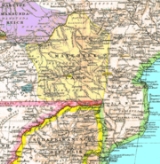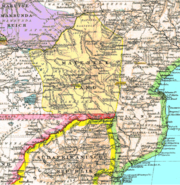
John Smith Moffat
Encyclopedia
Reverend John Smith Moffat (1835–1918) was a British missionary
and imperial agent
in southern Africa
, the son of missionary Robert Moffat
and brother-in-law of missionary explorer David Livingstone
.
Like his more famous father, John Moffat was a Congregationalist minister affiliated with the London Missionary Society
but he became involved in British colonial
expansion particularly in Matabeleland
, later part of Southern Rhodesia
, now Zimbabwe
.
His missionary work included helping to start the first mission in Matabeleland in 1859, and in 1865 he took over the running of his father's mission in Kuruman
. In 1879 he resigned from the missionary society and joined the British Bechuanaland colonial service. In 1888 at the instigation of Cecil Rhodes he was sent to Matabeleland
to use his father's reputation to persuade its king Lobengula
to sign a treaty of friendship with Britain and to look favorably on Rhodes' later approach for the Rudd Concession mining rights.
Having succeeded, Moffat discovered later the extent of Rhodes' deception of Lobengula and the deceit behind numerous concessions negotiated by Rhodes' British South Africa Company
, BSAC. He fell out with Rhodes when the latter provoked Lobengula into the First Matabele War
so he could take that country. In 1893 Moffat exposed the trickery behind the BSAC Bosman Concession in Ngamiland, which was abandoned as a result. In 1894 when the BSAC police clashed with warriors of the Bamangwato
King Khama III
in Bechuanaland, he warned that Rhodes' next victim was Khama, a British ally. But Moffat's boss, Shippard, was Rhodes's agent, and he dismissed Moffat.

Missionary
A missionary is a member of a religious group sent into an area to do evangelism or ministries of service, such as education, literacy, social justice, health care and economic development. The word "mission" originates from 1598 when the Jesuits sent members abroad, derived from the Latin...
and imperial agent
British Empire
The British Empire comprised the dominions, colonies, protectorates, mandates and other territories ruled or administered by the United Kingdom. It originated with the overseas colonies and trading posts established by England in the late 16th and early 17th centuries. At its height, it was the...
in southern Africa
Southern Africa
Southern Africa is the southernmost region of the African continent, variably defined by geography or geopolitics. Within the region are numerous territories, including the Republic of South Africa ; nowadays, the simpler term South Africa is generally reserved for the country in English.-UN...
, the son of missionary Robert Moffat
Robert Moffat
Robert Moffat was a Scottish Congregationalist missionary to Africa, and father in law of David Livingstone....
and brother-in-law of missionary explorer David Livingstone
David Livingstone
David Livingstone was a Scottish Congregationalist pioneer medical missionary with the London Missionary Society and an explorer in Africa. His meeting with H. M. Stanley gave rise to the popular quotation, "Dr...
.
Like his more famous father, John Moffat was a Congregationalist minister affiliated with the London Missionary Society
London Missionary Society
The London Missionary Society was a non-denominational missionary society formed in England in 1795 by evangelical Anglicans and Nonconformists, largely Congregationalist in outlook, with missions in the islands of the South Pacific and Africa...
but he became involved in British colonial
Colonialism
Colonialism is the establishment, maintenance, acquisition and expansion of colonies in one territory by people from another territory. It is a process whereby the metropole claims sovereignty over the colony and the social structure, government, and economics of the colony are changed by...
expansion particularly in Matabeleland
Matabeleland
Modern day Matabeleland is a region in Zimbabwe divided into three provinces: Matabeleland North, Bulawayo and Matabeleland South. These provinces are in the west and south-west of Zimbabwe, between the Limpopo and Zambezi rivers. The region is named after its inhabitants, the Ndebele people...
, later part of Southern Rhodesia
Southern Rhodesia
Southern Rhodesia was the name of the British colony situated north of the Limpopo River and the Union of South Africa. From its independence in 1965 until its extinction in 1980, it was known as Rhodesia...
, now Zimbabwe
Zimbabwe
Zimbabwe is a landlocked country located in the southern part of the African continent, between the Zambezi and Limpopo rivers. It is bordered by South Africa to the south, Botswana to the southwest, Zambia and a tip of Namibia to the northwest and Mozambique to the east. Zimbabwe has three...
.
His missionary work included helping to start the first mission in Matabeleland in 1859, and in 1865 he took over the running of his father's mission in Kuruman
Kuruman
Kuruman is a town with 12,701 inhabitants in Northern Cape province of South Africa, famous for its scenic beauty and the Eye of Kuruman, a geological feature bringing water from deep underground to the surface in the Kalahari Desert....
. In 1879 he resigned from the missionary society and joined the British Bechuanaland colonial service. In 1888 at the instigation of Cecil Rhodes he was sent to Matabeleland
Matabeleland
Modern day Matabeleland is a region in Zimbabwe divided into three provinces: Matabeleland North, Bulawayo and Matabeleland South. These provinces are in the west and south-west of Zimbabwe, between the Limpopo and Zambezi rivers. The region is named after its inhabitants, the Ndebele people...
to use his father's reputation to persuade its king Lobengula
Lobengula
Lobengula Khumalo was the second and last king of the Ndebele people, usually pronounced Matabele in English. Both names, in the Sindebele language, mean "The men of the long shields", a reference to the Matabele warriors' use of the Zulu shield and spear.- Background :The Matabele were related to...
to sign a treaty of friendship with Britain and to look favorably on Rhodes' later approach for the Rudd Concession mining rights.
Having succeeded, Moffat discovered later the extent of Rhodes' deception of Lobengula and the deceit behind numerous concessions negotiated by Rhodes' British South Africa Company
British South Africa Company
The British South Africa Company was established by Cecil Rhodes through the amalgamation of the Central Search Association and the Exploring Company Ltd., receiving a royal charter in 1889...
, BSAC. He fell out with Rhodes when the latter provoked Lobengula into the First Matabele War
First Matabele War
The First Matabele War was fought in 1893-1894 between the British South Africa Company military forces and the Ndebele people. Lobengula, king of the Ndebele, avoided outright war with the British settlers because he and his advisors were mindful of the destructive power of the European weapons...
so he could take that country. In 1893 Moffat exposed the trickery behind the BSAC Bosman Concession in Ngamiland, which was abandoned as a result. In 1894 when the BSAC police clashed with warriors of the Bamangwato
Bamangwato
The Bamangwato can be said to be one of the eight 'principal' Tswana tribes of Botswana, and just like any other Tswana tribe in Botswana, constitutes a small percent in the central district even in their capital serowe. They ruled over majority Bakalangaand other tribes such as the san,bitwa and...
King Khama III
Khama III
Khama III , also known as Khama the Good, was the kgosi of the Bamangwato people of Bechuanaland , who made his country a protectorate of the United Kingdom to ensure its survival against Boer and Ndebele encroachments.-Ancestry and Youth:During the 18th century, Malope, chief of the Bakwena...
in Bechuanaland, he warned that Rhodes' next victim was Khama, a British ally. But Moffat's boss, Shippard, was Rhodes's agent, and he dismissed Moffat.


